Project I
Redox Regulation of Cardiometabolic Diseases
Cardiometabolic diseases are on the rise within the United States especially in the Appalachian region (West Virginia- 2nd highest). Cardiometabolic diseases (CMD) includes obesity, Type 2 diabetes and cardiovascular diseases. Lifestyle modifications (diet and exercise) can help to reduce risk to CMD by regulating appetite and preventing metabolic dysfunction. Regulating redox stress is a key mechanism by which lifestyle modifications prevent CMD. Altering the gut-microbiome axis may also be involved. Our research utilizes novel stress-less mouse models (BBA 1863:2293-2306) to alter redox balance and improve appetite and microbiota. We are studying the effects of diets (high saturated, PUFA or omega-3 fatty acid rich diets) or exercise on appetite regulation (adipose-brain-liver cross-talk), gut microbiota and cardiometabolic endpoints in these mouse models. ECHO-MRI, CLAMS, rodent treadmills, rodent ultrasound, next generation sequencing, miRNA microarray, Luminex technology, Ingenuity pathway analysis etc are some of the cutting edge techniques that are routinely used in our studies.
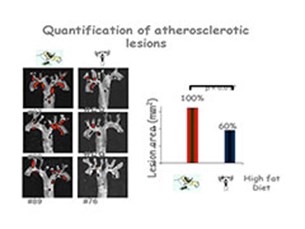
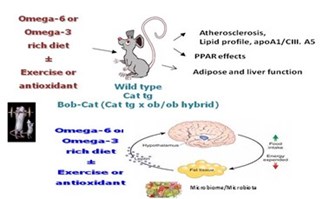
Project II
Aging and Adipose Dysfunction
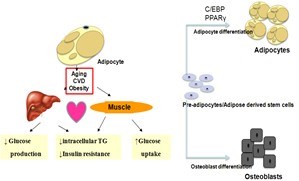 Aging increases risk to cardiometabolic diseases especially cardiovascular disease, insulin resistance leading to diabetes. Studies have shown a loss of adipose function with aging. Our studies using Aging rat models (Fischer 344 x Brown Norway hybrid rats-FBN) showed sex dependent changes in ectopic fat adipokine profile. Our studies further showed a loss in metabolic plasticity in preadipocytes (adipose derived stem cells) with aging. MicroRNAs that regulated adipocyte differentiation were dysfunctional (PLoS One, 2013, 8(3):e59238, J Physiol & Biochem, 2017, 73:215-224). Our NIH (NIA) funded study investigates the association between increased risk to insulin resistance during aging to changes in pathways that regulate microRNA biogenesis and function in the adipose tissue.
Aging increases risk to cardiometabolic diseases especially cardiovascular disease, insulin resistance leading to diabetes. Studies have shown a loss of adipose function with aging. Our studies using Aging rat models (Fischer 344 x Brown Norway hybrid rats-FBN) showed sex dependent changes in ectopic fat adipokine profile. Our studies further showed a loss in metabolic plasticity in preadipocytes (adipose derived stem cells) with aging. MicroRNAs that regulated adipocyte differentiation were dysfunctional (PLoS One, 2013, 8(3):e59238, J Physiol & Biochem, 2017, 73:215-224). Our NIH (NIA) funded study investigates the association between increased risk to insulin resistance during aging to changes in pathways that regulate microRNA biogenesis and function in the adipose tissue.
Epicardial Fat and Vascular Cross Talk
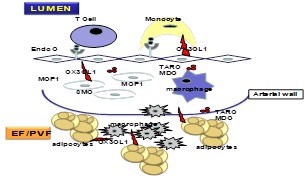 Cardiovascular disease rates are still highest in the Appalachian region. These high rates are attributed to high prevalence of obesity within this region. Increase in visceral/abdominal adiposity is a hallmark for obesity. However, increase in ectopic fat (deposition of fat in non-adipose tissue) increases risk to obesity-associated complications (coronary artery disease, insulin resistance, non-alcoholic fatty liver disease, etc). Increase in fat that surrounds the heart or vasculature (epicardial fat) is a marker for future cardiovascular events (Images to the Left and Right). Studies in our laboratory are investigating the role of epicardial/perivascular fat (the fat that surrounds the heart and the coronaries) in risk to cardiovascular diseases in animal models and humans with coronary artery disease (CAD) (in collaboration with Department Thoracic Surgery). We are investigating the role of microRNA and epigenetic pathways in adipose dysfunction. Epicardial fat-cardiomyocyte cross talk studies are being conducted using animal models and ex-vivo cell culture models.
Cardiovascular disease rates are still highest in the Appalachian region. These high rates are attributed to high prevalence of obesity within this region. Increase in visceral/abdominal adiposity is a hallmark for obesity. However, increase in ectopic fat (deposition of fat in non-adipose tissue) increases risk to obesity-associated complications (coronary artery disease, insulin resistance, non-alcoholic fatty liver disease, etc). Increase in fat that surrounds the heart or vasculature (epicardial fat) is a marker for future cardiovascular events (Images to the Left and Right). Studies in our laboratory are investigating the role of epicardial/perivascular fat (the fat that surrounds the heart and the coronaries) in risk to cardiovascular diseases in animal models and humans with coronary artery disease (CAD) (in collaboration with Department Thoracic Surgery). We are investigating the role of microRNA and epigenetic pathways in adipose dysfunction. Epicardial fat-cardiomyocyte cross talk studies are being conducted using animal models and ex-vivo cell culture models.
Project III
Epigenetics In Endometriosis and Ovarian Cancer
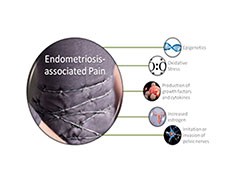 Endometriosis is an inflammatory/epigenetic disorder affecting about 10% of young women. The classic symptoms are infertility and chronic pelvic pain. Typically this pain is treated with non-steroidal anti-inflammatory drugs (NSAIDs), or with drugs that address the hormonal aspects of the disorder. Research from our laboratory over the past 20 years has shown the importance of oxidative stress in the etiology of both endometriosis and its associated pain (Pain, 2015, 156(3):528-39; Redox Biol, 2017, 12:956-966). Our clinical studies have shown the beneficial effects of antioxidant therapy (Vitamin E & C) in lowering the pain associated with endometriosis (Transl Res. 2013;161(3):189-95; Reprod. Sci. 2017;24:619-626). In collaboration with the Department of Obstetrics and Gynecology, Joan C. Edwards School of Medicine,
Endometriosis is an inflammatory/epigenetic disorder affecting about 10% of young women. The classic symptoms are infertility and chronic pelvic pain. Typically this pain is treated with non-steroidal anti-inflammatory drugs (NSAIDs), or with drugs that address the hormonal aspects of the disorder. Research from our laboratory over the past 20 years has shown the importance of oxidative stress in the etiology of both endometriosis and its associated pain (Pain, 2015, 156(3):528-39; Redox Biol, 2017, 12:956-966). Our clinical studies have shown the beneficial effects of antioxidant therapy (Vitamin E & C) in lowering the pain associated with endometriosis (Transl Res. 2013;161(3):189-95; Reprod. Sci. 2017;24:619-626). In collaboration with the Department of Obstetrics and Gynecology, Joan C. Edwards School of Medicine, 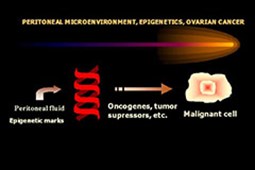 Marshall University we are investigating mechanisms involved in endometriosis-associated pain with the hope of uncovering more effective treatment options. We are using novel techniques in the fields of redox biology and epigenetics to produce new therapeutic options (Image to the Left)
Marshall University we are investigating mechanisms involved in endometriosis-associated pain with the hope of uncovering more effective treatment options. We are using novel techniques in the fields of redox biology and epigenetics to produce new therapeutic options (Image to the Left)
Endometriosis increases risk to ovarian cancer. In collaboration with the Edwards Comprehensive Cancer Center, Marshall University, we are studying the role of peritoneal microenvironment on endometriosis related ovarian cancer (Annals Transl Med. 2020). We are studying epigenetic pathways that link endometriosis and ovarian cancer (Image to the Right).




 Aging increases risk to cardiometabolic diseases especially cardiovascular disease, insulin resistance leading to diabetes. Studies have shown a loss of adipose function with aging. Our studies using Aging rat models (Fischer 344 x Brown Norway hybrid rats-FBN) showed sex dependent changes in ectopic fat adipokine profile. Our studies further showed a loss in metabolic plasticity in preadipocytes (adipose derived stem cells) with aging. MicroRNAs that regulated adipocyte differentiation were dysfunctional (PLoS One, 2013, 8(3):e59238, J Physiol & Biochem, 2017, 73:215-224). Our NIH (NIA) funded study investigates the association between increased risk to insulin resistance during aging to changes in pathways that regulate microRNA biogenesis and function in the adipose tissue.
Aging increases risk to cardiometabolic diseases especially cardiovascular disease, insulin resistance leading to diabetes. Studies have shown a loss of adipose function with aging. Our studies using Aging rat models (Fischer 344 x Brown Norway hybrid rats-FBN) showed sex dependent changes in ectopic fat adipokine profile. Our studies further showed a loss in metabolic plasticity in preadipocytes (adipose derived stem cells) with aging. MicroRNAs that regulated adipocyte differentiation were dysfunctional (PLoS One, 2013, 8(3):e59238, J Physiol & Biochem, 2017, 73:215-224). Our NIH (NIA) funded study investigates the association between increased risk to insulin resistance during aging to changes in pathways that regulate microRNA biogenesis and function in the adipose tissue. Cardiovascular disease rates are still highest in the Appalachian region. These high rates are attributed to high prevalence of obesity within this region. Increase in visceral/abdominal adiposity is a hallmark for obesity. However, increase in ectopic fat (deposition of fat in non-adipose tissue) increases risk to obesity-associated complications (coronary artery disease, insulin resistance, non-alcoholic fatty liver disease, etc). Increase in fat that surrounds the heart or vasculature (epicardial fat) is a marker for future cardiovascular events (Images to the Left and Right). Studies in our laboratory are investigating the role of epicardial/perivascular fat (the fat that surrounds the heart and the coronaries) in risk to cardiovascular diseases in animal models and humans with coronary artery disease (CAD) (in collaboration with Department Thoracic Surgery). We are investigating the role of microRNA and epigenetic pathways in adipose dysfunction. Epicardial fat-cardiomyocyte cross talk studies are being conducted using animal models and ex-vivo cell culture models.
Cardiovascular disease rates are still highest in the Appalachian region. These high rates are attributed to high prevalence of obesity within this region. Increase in visceral/abdominal adiposity is a hallmark for obesity. However, increase in ectopic fat (deposition of fat in non-adipose tissue) increases risk to obesity-associated complications (coronary artery disease, insulin resistance, non-alcoholic fatty liver disease, etc). Increase in fat that surrounds the heart or vasculature (epicardial fat) is a marker for future cardiovascular events (Images to the Left and Right). Studies in our laboratory are investigating the role of epicardial/perivascular fat (the fat that surrounds the heart and the coronaries) in risk to cardiovascular diseases in animal models and humans with coronary artery disease (CAD) (in collaboration with Department Thoracic Surgery). We are investigating the role of microRNA and epigenetic pathways in adipose dysfunction. Epicardial fat-cardiomyocyte cross talk studies are being conducted using animal models and ex-vivo cell culture models. Endometriosis is an inflammatory/epigenetic disorder affecting about 10% of young women. The classic symptoms are infertility and chronic pelvic pain. Typically this pain is treated with non-steroidal anti-inflammatory drugs (NSAIDs), or with drugs that address the hormonal aspects of the disorder. Research from our laboratory over the past 20 years has shown the importance of oxidative stress in the etiology of both endometriosis and its associated pain (Pain, 2015, 156(3):528-39; Redox Biol, 2017, 12:956-966). Our clinical studies have shown the beneficial effects of antioxidant therapy (Vitamin E & C) in lowering the pain associated with endometriosis (
Endometriosis is an inflammatory/epigenetic disorder affecting about 10% of young women. The classic symptoms are infertility and chronic pelvic pain. Typically this pain is treated with non-steroidal anti-inflammatory drugs (NSAIDs), or with drugs that address the hormonal aspects of the disorder. Research from our laboratory over the past 20 years has shown the importance of oxidative stress in the etiology of both endometriosis and its associated pain (Pain, 2015, 156(3):528-39; Redox Biol, 2017, 12:956-966). Our clinical studies have shown the beneficial effects of antioxidant therapy (Vitamin E & C) in lowering the pain associated with endometriosis ( Marshall University we are investigating mechanisms involved in endometriosis-associated pain with the hope of uncovering more effective treatment options. We are using novel techniques in the fields of redox biology and epigenetics to produce new therapeutic options (Image to the Left)
Marshall University we are investigating mechanisms involved in endometriosis-associated pain with the hope of uncovering more effective treatment options. We are using novel techniques in the fields of redox biology and epigenetics to produce new therapeutic options (Image to the Left)